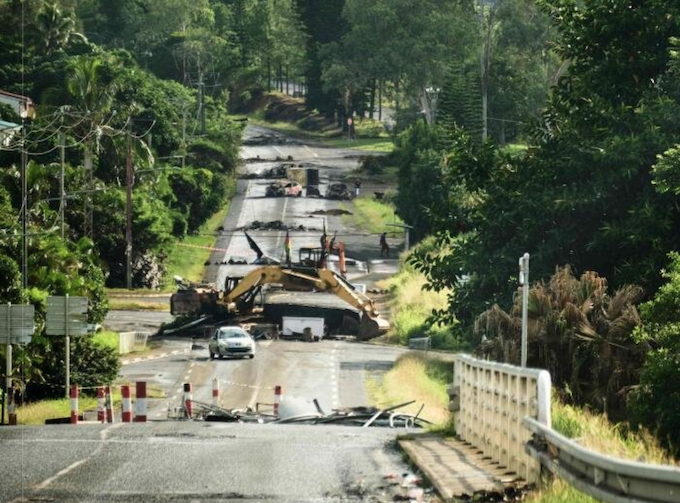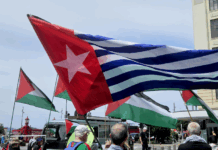
Pacific Media Watch
The Paris-based global media freedom watchdog Reporters Without Borders (RSF) has called for guaranteed safety for journalists in the French Pacific territory of Kanaky New Caledonia after an increase in intimidation, threats, obstruction and attacks against them.
After a week of violence that broke out in the capital of Nouméa following a controversial parliamentary vote for a bill expanding the settler electorate in New Caledonia, RSF said in a statement that the crisis was worrying for journalists working there.
RSF called on the authorities and “all the forces involved” to ensure their safety and guarantee the right to information.
- READ MORE: President Emmanuel Macron to fly to New Caledonia within hours
- Liberation for New Caledonia’s Kanak people ‘must come’, says media educator – Audio
- ‘You are not alone’ Pacific messages of solidarity for Kanaky
- Other Kanaky New Caledonia crisis reports
While covering the clashes in Nouméa on Friday, May 17, a crew from the public television channel Nouvelle-Calédonie La 1ère, consisting of a journalist and a cameraman, were intimidated by about 20 unidentified hooded men.
They snatched the camera from the cameraman’s hands and threatened him with a stone, before smashing the windows of the journalists’ car and trying to seize it.
“The public broadcaster’s crew managed to escape thanks to the support of a motorist. France Télévisions management said it had filed a complaint the same day,” RSF reported.
According to a dozen accounts gathered by RSF, working conditions for journalists deteriorated rapidly from Wednesday, May 15, onwards.
Acts of violence
As the constitutional bill amending New Caledonia’s electoral body was adopted by the National Assembly on the night of May 14/15, a series of acts of violence broke out in the Greater Nouméa area, either by groups protesting against the electoral change or by militia groups formed to confront them.
The territory has been placed under a state of emergency and is subject to a curfew from which journalists are exempt.
RSF is alerting the authorities in particular to the situation facing freelance journalists: while some newsrooms are organising to send support to their teams in New Caledonia, freelance reporters find themselves isolated, without any instructions or protective equipment.
“The attacks on journalists covering the situation in New Caledonia are unacceptable. Everything must be done so that they can continue to work and thus ensure the right to information for all in conditions of maximum safety,” said Anne Bocandé,
editorial director of RSF.
“RSF calls on the authorities to guarantee the safety and free movement of journalists throughout the territory.
“We also call on all New Caledonian civil society and political leaders to respect the integrity and the work of those who inform us on a daily basis and enable us to grasp the reality on the ground.”
While on the first day of the clashes on Monday, May 13, according to the information gathered by RSF, reporters managed to get through the roadblocks and talk to all the forces involved — especially those who are well known locally — many of them are still often greeted with hostility, if not regarded as persona non grata, and are the victims of intimidation, threats or violence.
“At the roadblocks, when we are identified as journalists, we receive death threats,” a freelance journalist told RSF.
“We are pelted with stones and violently removed from the roadblocks. The situation is likely to get worse”, a journalist from a local media outlet warned RSF.
As a result, most of the journalists contacted by RSF are forced to work only in the area around their homes.
“In any case, we’re running out of petrol. In the next few days, we’re going to find it hard to work because of the logistics,” said a freelance journalist contacted by RSF.
Distrust of journalists
The 10 or so journalists contacted by RSF — who requested anonymity against a backdrop of mistrust — have at the very least been the target of repeated insults since the start of the fighting.
According to information gathered by RSF, these insults continue outside the roadblocks, on social networks.
The majority of the forces involved, who are difficult for journalists to identify, share a mistrust of the media coupled with a categorical refusal to be recognisable in the images of reporters, photographers and videographers.
On May 15, President Emmanuel Macron declared an immediate state of emergency throughout New Caledonia. On the same day, the government announced a ban on the social network TikTok.
President Macron is due in New Caledonia today to introduce a “dialogue mission” in an attempt to seek solutions.
To date, six people have been killed and several injured in the clashes.
Pacific Media Watch collaborates with Reporters Without Borders.












































